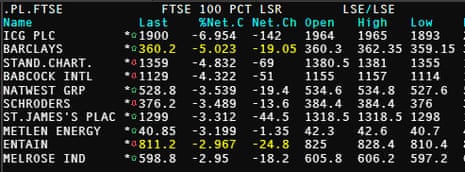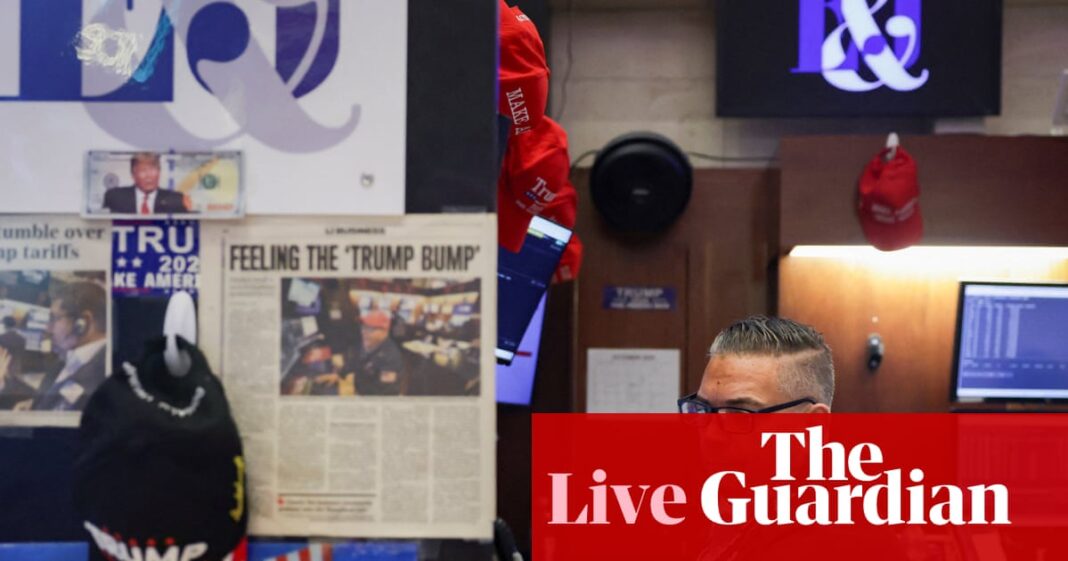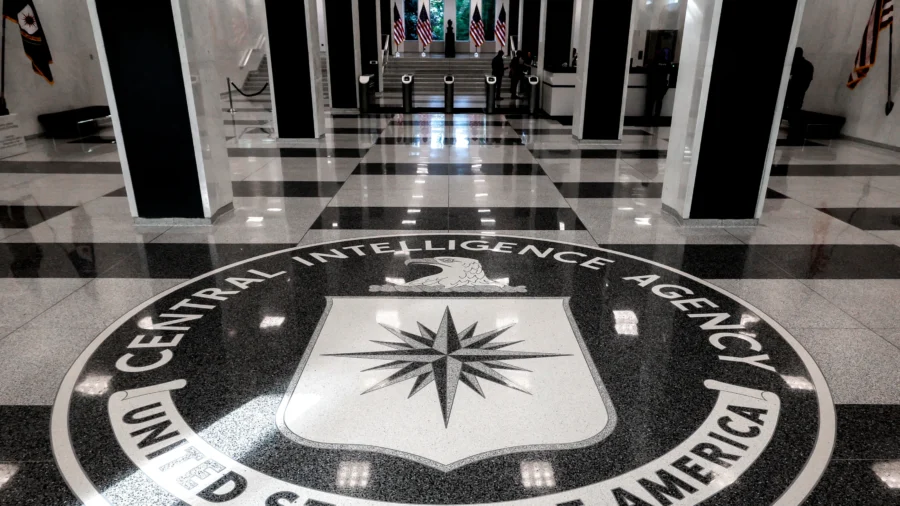Our news story about the sell-off in the markets this morning:
Global stock markets fell sharply and gold hit a record high after two US regional banks said they had been left exposed to millions of dollars of bad loans and alleged fraud.
Signs of credit stress rattled markets across Europe and Asia. In London the FTSE 100 fell 1.5%, Germany’s Dax fell 2%, the Ibex in Spain was off 0.8% and France’s Cac 40 dropped 1.5%, before recovering some ground.
Concerns over credit stress in the network of loans to businesses across the world’s largest economy fuelled heavy losses on Wall Street on Thursday, followed by Asian markets, with Japan’s Nikkei 225 falling 1.6% and the Hang Seng in Hong Kong dropping 2%. US markets are expected to open down later on Friday.
Jittery investors turned to safe haven assets, with gold hitting a new record of $4,378 (£3,262) an ounce, a weekly gain of almost 8.5%, its biggest since the 2008 financial crisis.
More here:
Key events
Fear index highest since April
Wall Street’s fear index has jumped this week, as worries grip the markets.
The VIX index, which tracks volatility in the markets, surged by over 22% yesterday to its highest closing level since April.
It’s up another 6% again this morning, to 26.89 points.
Our news story about the sell-off in the markets this morning:
Global stock markets fell sharply and gold hit a record high after two US regional banks said they had been left exposed to millions of dollars of bad loans and alleged fraud.
Signs of credit stress rattled markets across Europe and Asia. In London the FTSE 100 fell 1.5%, Germany’s Dax fell 2%, the Ibex in Spain was off 0.8% and France’s Cac 40 dropped 1.5%, before recovering some ground.
Concerns over credit stress in the network of loans to businesses across the world’s largest economy fuelled heavy losses on Wall Street on Thursday, followed by Asian markets, with Japan’s Nikkei 225 falling 1.6% and the Hang Seng in Hong Kong dropping 2%. US markets are expected to open down later on Friday.
Jittery investors turned to safe haven assets, with gold hitting a new record of $4,378 (£3,262) an ounce, a weekly gain of almost 8.5%, its biggest since the 2008 financial crisis.
More here:
AJ Bell: spooked investors fear a crisis is brewing.
Today’s selloff follows growing concern that a bubble was building in the markets.
But while a lot of the chat has been about the surging valuation of artificial intelligence companies, it’s the banking sector that triggered the drop in shares today.
Russ Mould, investment director at AJ Bell, explains:
“US banking stocks were notably weak yesterday as investors worried about exposure to bad loans. That spread to Europe on Friday, with Barclays, Standard Chartered, NatWest and HSBC all dragging the FTSE 100 down.
“Pockets of the US banking sector including regional banks have given the market cause for concern. Investors have started to question why there have been a plethora of issues in a short space of time and whether this points to poor risk management and loose lending standards. This includes Zions flagging an unexpected loss on two loans and Western Alliance alleging a borrower had committed fraud.
“The pullback in UK-listed banks will be sentiment-driven. Investors have been spooked and moved to trim positions in the sector, possibly opting to have lower exposure in case a crisis is brewing. There is no evidence of any issues with the London-listed core banking names, but investors often have a knee-jerk reaction when problems appear anywhere in the sector.
“However, investors are watching one London-listed name in the broader financials sector very closely. ICG, formerly called Intermediate Capital Group, was the biggest faller on the FTSE 100 as it has exposure to private credit and asset-backed finance.
Bond yields fall amid concerns about credit and regional banks
Government borrowing costs are falling today, as investors seek out the relative safety of bonds.
Prices of US Treasuries, and UK gilts, are both rising today, which pushes down the yield (the effective interest rate) on these bonds.
Falling UK yields are a boost to Rachel Reeves; lower borrowing costs will help the chancellor keep within her fiscal rules.
Gilt yields have been falling this week, as Reeves reiterated her commitment to controlling borrowing and hinted at tax rises for the wealthy.
But it does also appear that this week’s moves are driven by worries about problems lurking in the US private credit, and regional banking, sectors.
As Allianz’s chief economic advisor Mohamed El-Erian explains:
Of note, the yield on the 10-year US Treasury has fallen below 4% as credit concerns weigh on regional bank stocks (Bloomberg charts below). This follows warnings from Jamie Dimon, JP Morgan CEO, about credit “cockroaches”.
Wall Street futures are down
Wall Street is heading for fresh losses when trading opens in New York.
The futures market shows that the S&P 500 share index is on track to drop by 1.2%, while the tech-focused Nasdaq 100 futures are down 1.4%.
Dow Jones Industrial Average futures are down 1% (the Dow contains 30 large US companies).
There could be larger losses among small companies. The futures contract for the Russell 2000 index (which tracks smaller listed companies) is down 2%.
European banking stocks tumble as US fears hit markets
It’s turning into a bad morning for European banks; an index which tracks the sector has fallen by 2.8% so far this session.
The fallers are being led by Banco de Sabadell (-6.2%), Deutsche Bank (-5.95%), and Barclays (-5.7%).
Chris Beauchamp, chief market analyst at IG, says
“It was an ugly session on Wall Street yesterday, as small gains gave way to an accelerating move to the downside on fears about the US regional bank system.
This feels like a rerun of 2023, but it comes as the market is struggling to digest the latest US-China trade spat and spells trouble in the short-term at least. Sentiment remains skittish, and the instinct will be to sell first and ask questions later.”
Elsewhere in the markets, Novo Nordisk’s shares have dropped 5.5% after Donald Trump said that the price of Danish drugmaker’s best-selling weight-loss drug would be lowered.
Trump made the comments during a White House event on fertility treatments and drug pricing. He was asked by reporters to identify the name of a drug that he earlier in the event said would be made less expensive.
UK stock market on track for worst day since April
As things stand, the FTSE 100 (now -147 points, or -1.57%) is on track for its biggest one-day loss since early April.
That was the week when Donald Trump triggered a market slump by announcing new tariffs on America’s trading partners.
Storm clouds are gathering over the financial markets, warns Richard Hunter, head of markets at interactive investor:
There are increasing signs of storm clouds gathering over markets, with little relief from the building wall of worry.
Already grappling with stretched stock valuations in the AI space, an unresolved government shutdown and a deteriorating relationship between Beijing and Washington, investors were exposed to a new source of concern in the form of lending practices and bad loans for US regional banks.
Of themselves, the credit losses announced by two regional banks were limited and seem to be contained. While there are hopes that this could be an isolated incident, the episode brought back unwelcome memories of the Silicon Valley Bank collapse in 2023 and, with several regional banks yet to report, investors are on high alert. Indeed, despite there being no obvious read across to the large banks, the reports were enough to put the skids under the sector as a whole, with losses of around 3% more or less across the board.
Almost every one of the hundred stocks on the FTSE 100 index is lower this morning.
There are just five risers, led by publisher Pearson (+2.9%) which reported sales growth this morning, and engineering firm Smiths Group (+1.3%) which sold an interconnect unit yesterday.
The UK stock market is continuing to slide.
Twenty minutes into trading, the FTSE 100 index is down 150 points or 1.6% at 9285 points, with financial stocks continuing to lead the fallers.

Fears are swirling today that we could be facing a repeat of the US regional banking crisis of 2023.
That episode led to the demise of US bank SVB and then Europe’s Credit Suisse.
As Jim Reid, market strategist at Deutsche Bank, told clients:
An initially positive risk mood turned during the US session yesterday after news that Zions Bancorp (-13.14%) made a $50m charge-off while Western Alliance (-10.81%) alleged it also suffered from fraud on loans to the same borrowers linked to distressed commercial mortgages.
While this was an ostensibly isolated story at two banks each less than $10bn market cap, the event drew inevitable comparisons to the regional bank stress that followed the collapse of SVB in March 2023 and raised broader questions over potential credit quality issues after a lengthy period of elevated rates and expansion in private credit, following also the bankruptcy of subprime auto lender Tricolor last month.
European stock markets have also dropped like stones at the open.
France’s CAC 40 has fallen 1.5%, Spain’s IBEX lost 1.2%, and German’s DAX has lost 1.9%.
FTSE 100 tumbles at the open amid US regional banking worries
The London stock market has fallen sharply at the start of trading, as investor confidence is rocked by fears over problems in the US regional banking sector.
The FTSE 100 index of blue-chip shares has tumbled by 131 points at the start of trading, a fall of 1.4%, down to 9304 points.
Banks are among the top fallers, with Barclays down 4.7%, Standard Chartered losing 4.3% and NatWest off 3.1%. Asset manager ICG has lost 5%.
Traders are alarmed that two US banks yesterday disclosed issues with bad and fraudulent loans, raising fears that more problems may be lurking in the sector.
This comes on top of rising fears about the private credit sector, with IMF chief Kristalina Georgieva admitting yesterday that this keeps her awake at night.
Derren Nathan, head of equity research, Hargreaves Lansdown, explains why markets are sliding, with Wall Street set for fresh losses:
US stock futures are down today, as credit concerns compound the jitters over an escalation in US-China trade tensions and the ongoing government shutdown in Washington. This comes after Wall Street closed lower on Thursday. Despite growing hopes of further rate cuts this year, attention is turning to the underlying health of the economy, as emerging credit losses amongst America’s regional banks raised further questions about lending practices.
That’s done little to calm jitters about contagion from the bankruptcy of auto parts supplier First Brands, after it racked up billions of dollars in off-balance sheet trade financing agreements. This sort of debt can be difficult to map and it will take a while for the saga to play out. But on the flipside, the big US banks remain well capitalised and appear to be in rude health after Goldman Sachs, JPMorgan, Citi and Wells Fargo all beat Q3 estimates earlier in the week.
Asia-Pacific markets slide
Asia-Pacific markets have fallen today, led by a sharp selloff in China.
China’s CSI300 index has dropped by 2.3%, while Japan’s Nikkei is down 1%.
Stock seem to be under pressure after losses on Wall Street yesterday, due to worries about the US regional banking sector.
Reuters also attributes the selloff to “investor caution over trade uncertainties and profit-taking in artificial intelligence shares”.
Jitters are rising about US regional banks, after two lenders disclosed issues with bad and fraudulent loans.
Regional banking stocks fell sharply yesterday, as Wall Street fretted about the state of credit markets.
Zions Bancorp announced it had a $50m charge-off over two bad loans from its subsidiary, California Bank & Trust in San Diego. Western Alliance also said it was dealing with a fraudulent borrower.
More here:
Kyle Rodda, senior financial market analyst at capital.com, says:
Financial stability risks reared their head [yesterday], with two separate regional banks announcing a significant write down due to exposure to one major borrower. Such events raised fears about systemic risks.
While meaty, the size of the bad loans in and of itself is unlikely to pose risks to the overall system. However, the underlying cause of the write-down is lax lending standards and fraud, stoking fears that such behaviour is endemic and liable to see similar defaults occur.
The pound has climbed to its highest level against the dollar in over a week this morning.
Sterling is up a quarter of a cent today at $1.3455, the strongest level since 7 October.
Dollar on track for worst week since August
Good morning, and welcome to our rolling coverage of business, the financial markets and the world economy.
It’s been a rough week for the US dollar, which is set for its biggest weekly drop in two and a half months.
Rising trade tensions between the US and China, and worries that America’s economy may be weakening, have pulled down the greenback against other currencies this week.
The dollar index, which tracks its performance against a basket of currencies, has lost 0.95% so far this week – the biggest five-day drop since early August.
The dollar weakened after Donald Trump threatened new 100% tariffs on China in a row over its rare earth exports last Friday.
Earlier this week, US trade representative Jamieson Greer claimed those export restrictions were a “global supply-chain power grab”, denting hopes of détente between Washington and Beijing.
Concerns about the US economy – which is currently in an economic data blackout due to the government shutdown – is encouraging some investors to diversify away from assets such as the dollar, and Treasury bills, into harder assets such as gold.
Suspicions that US interest rates could be cut steadily in the months ahead are also weighing on the dollar.
Raffi Boyadjian, lead market analyst at Trading Point, explains:
The US dollar…has been sliding since trade relations started to worsen again. Against a basket of currencies, the dollar tumbled to a more than one-week low today before recovering slightly.
Fed Chair Powell’s remarks this week have also been weighing on the greenback. An October rate cut is almost certain after Powell once again emphasized the growing downside risks to the labour market, even in the absence of official payrolls data.
The ongoing government shutdown is another risk that could upend the dollar’s mini rebound since mid-September.


